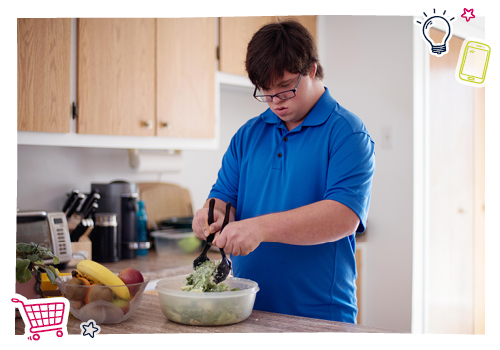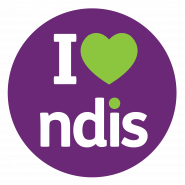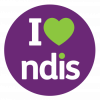Occupational Therapy – Help With Everyday Living & Community Access
Together we help you build your abilities and experience the joy of living.
Our in-demand team of occupational therapists are dedicated to helping you live a healthy and purposeful life, whatever your specific goals may be under the NDIS.
We work with you and your personal network to tailor an individual program, helping you take ownership of the process and achieve what you want from life, now and in the future.
No matter what is meaningful to you, our OTs work with empathy and enthusiasm on ways to grow your independence, helping you do the things you want, at home and in the community.
With care and respect, and without judgement or assumptions, we listen, build rapport and trust so that we know how best to work with you, and achieve your potential.
Ready to get started?

Managing tasks at home
We’ll support you to improve your ability to perform everyday tasks in your home. Whether this involves bathing, dressing or other necessary tasks such as making meals with as little assistance as possible, our therapists will assess your unique situation and develop a plan to help you live your life in the best way possible.
Our team works with people of any age, including children and older people, and from all walks of life. We use techniques such as play-based therapy and we take a holistic, client-and family-centred approach, often working within multidisciplinary teams of health professionals to improve the overall wellbeing of our clients.
No matter what daily living tasks and activities you choose to engage in, we’ll identify your strengths and difficulties, and help you work out practical techniques and solutions.
Our daily living disability services can help you with:
- Improving your degree of function and independence for personal care tasks, such as bathing, dressing and going to the bathroom
- Managing activities of daily living, such as meal preparation and domestic tasks
- Home modification support to make tasks easier
- Developing sleep routines for children
- Researching and prescribing assistive technology, such as mobility aids
- Occupational Therapy Mobility equipment such as wheelchairs and scooters
Accessing your community
For most people, including people living with disability, community access – visiting friends and family, the local park or library, or the shops – is an important part of everyday life. As social beings, getting out and about can be really enjoyable and contributes a great deal to our quality of life.
This is not an easy undertaking for everyone. Our OTs use the latest research and technologies in their field to help you navigate the complexities of settings outside the home, such as public transport, roads and crossings. By helping to improve your confidence with everyday activities, such as reading a bus timetable, or buying a train card, you or your loved one will soon develop far greater independence.
We can help you with:
- Navigating different forms of public transport
- Vehicle modifications
- Improving your confidence in social situations
- Workplace skills
- Accessing community services, such as sporting clubs, schools, and libraries
- Improving your relationships and making friends
Are you ready to get started? It’s easy!
Why choose us?

Achieve your goals

Local allied health professionals

Multidisciplinary Care
Multidisciplinary care is when a team of health professionals with different skills collaborate to support as many of your needs as possible. Our multidisciplinary team can support you reach your goals!
What People Say About Us
Everyday Living & Community Access Frequently Asked Questions
The NDIS provides a range of different types of support to help people living with disability live more independently and participate in their communities. Services included within NDIS improved daily living support can include:
- Personal care supports, including assistance with activities of daily living such as bathing, dressing, grooming, and toileting.
- Household tasks, including support with household tasks such as cleaning, laundry, meal preparation, and grocery shopping.
- Community access, including support with accessing the community and participating in social, recreational, or educational activities.
- Support with navigating transportation to appointments, community activities, and other destinations.
- Home modifications, including modifications to the home environment to increase accessibility and safety, such as installing ramps, grab bars, or accessible showers.
- Assistive technology, including aids and Occupational Therapy tools and equipment to support independence and participation, such as mobility aids, communication devices, or sensory supports.
The type of and amount of support provided under the NDIS will depend on the individual’s goals, needs, and specific circumstances. Improved daily living disability support services are tailored to meet individual needs and can be adjusted over time as needs change.
SIL (Supported Independent Living) and SDA (Specialist Disability Accommodation) are two different categories of disability living support provided under the National Disability Insurance Scheme (NDIS). Both are suitable for fostering daily living skills for people with an intellectual disability or a physical disability.
SIL refers to support provided to people with a disability who require assistance with daily living tasks in a shared living arrangement, such as a group home or shared apartment. This may include support with personal care and household tasks, as well as assistance with community access support. The goal of SIL is to promote independence and community participation, while providing a safe and supportive living environment.
SDA refers to accommodation that is specifically designed and built for people living with disability who have complex or high support needs. SDA properties are typically purpose-built to provide high levels of accessibility, including features such as wider doorways, adjustable benches, and accessible bathrooms. SDA funding under the NDIS is used to cover the costs associated with the design, construction, and maintenance of these properties.
At Ability Action Australia, we provide SDA and SIL assessments to assist with ensuring participants have the right level of support and NDIS funding to achieve their goals and get more out of life today.
Occupational therapy driving assessments are designed to assess a person’s ability to drive safely and independently. Based on the results of the assessment, the occupational therapist will provide recommendations for driving restrictions, modifications, or alternative transportation options if driving is not safe or feasible.
The assessment typically involves several components, including:
- Medical and functional assessment: The occupational therapist will review the person’s medical history and current health status, as well as their physical, cognitive, and visual abilities related to driving.
- On-road assessment: The person will drive a vehicle under the supervision of the occupational therapist, who will assess their driving skills and ability to safely navigate different road conditions and traffic situations.
- Off-road assessment: The occupational therapist may use various tests and assessments to evaluate the person’s cognitive, perceptual, and motor abilities related to driving, such as reaction time, visual processing, and decision-making skills.
- Vehicle modification assessment: If the person requires modifications to their vehicle to drive safely, the occupational therapist may assess their ability to use these modifications effectively and make recommendations for additional modifications if necessary.

NDIS Occupational Therapy
The National Disability Insurance Scheme (NDIS) is a way of supporting people with permanent and significant disability. The NDIS is designed to give individuals greater choice and control over when, where and how their funded supports are provided. The specific support and funding available is based on each individual’s specific needs. You can find out more about what therapeutic supports are funded by referring to the NDIS website.
Ability Action Australia has the capability to provide Occupational Therapy Australia wide.




